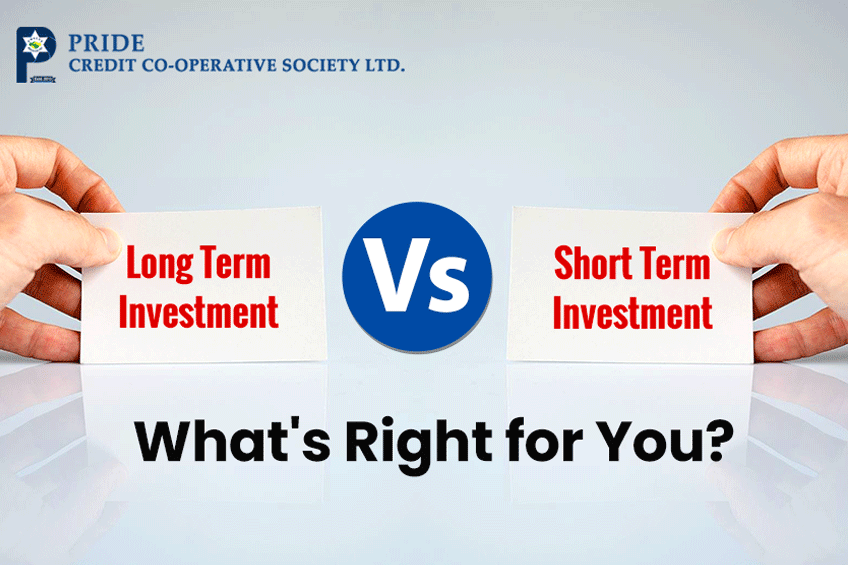Are you aiming for quick gains in the short term, or are you patient enough to let your investments grow over several years or even decades? This is where the distinction between long-term and short-term investments becomes crucial.
Investing your hard-earned money can be a pivotal step towards achieving your financial goals and securing your future. However, one of the fundamental decisions you'll face as an investor is whether to opt for long-term or short-term investments.
Each approach comes with its set of advantages and considerations, making it essential to understand the differences and choose the strategy that aligns best with your financial objectives.
Your choice between long-term and short-term investments should align with your financial goals, risk tolerance, and investment horizon.
Let's explore the nuances of both approaches to help you make an informed decision.
Long-Term Investments: Planting Seeds for the Future
Long-term investments are like planting a tree: you patiently nurture it over time, knowing that it will grow into something substantial.
Advantages of Long-Term Investments:
- Compounding Returns : Long-term investments have the advantage of benefiting from compounding returns. This means that as your investments generate returns, those returns are reinvested, leading to exponential growth over time.
- Lower Tax Rates : In many countries, long-term capital gains are often taxed at a lower rate compared to short-term gains, making long-term investments tax-efficient.
- Weathering Market Volatility : Long-term investors can withstand market fluctuations and economic downturns, as they have time on their side. This can reduce the emotional stress associated with frequent market changes.
- Achieving Major Financial Goals : Long-term investments are ideal for objectives such as retirement planning, buying a home, or funding a child's education, as these goals typically span several years or decades.
Considerations for Long-Term Investments:
- Illiquidity : Long-term investments may tie up your funds for an extended period, making them less suitable for immediate financial needs.
- Market Risk : While long-term investments can weather market volatility, they are not immune to it. Diversification and careful selection of assets are essential.
- Limited Access : Some long-term investments, such as retirement accounts, come with restrictions on early withdrawals. Be sure to understand the terms and conditions.
Short-Term Investments: Seizing Opportunities Today
Short-term investments are akin to seizing opportunities in the present moment. They offer liquidity and flexibility.
Advantages of Short-Term Investments:
- Liquidity : Short-term investments are highly liquid, meaning you can access your funds quickly if needed. This makes them suitable for emergency savings or near-term financial goals.
- Flexibility : Short-term investments allow you to adapt to changing circumstances and capitalize on immediate opportunities, such as a promising business venture or a real estate deal.
- Reduced Market Risk : Short-term investments are generally less exposed to market volatility since you are not committed to the market for an extended period.
- Risk Mitigation : Short-term investments can serve as a buffer against unexpected expenses or financial emergencies, preventing you from tapping into long-term savings.
Considerations for Short-Term Investments:
- Lower Returns : Short-term investments typically offer lower returns compared to long-term investments, primarily due to the reduced time for compounding.
- Inflation Impact : Over time, the purchasing power of money can erode due to inflation, potentially reducing the real return on short-term investments.
- Taxation : Short-term gains are often subject to higher tax rates in many jurisdictions, which can eat into your returns.
Conclusion: Finding Your Investment Balance
In the realm of investments, there is no universally superior choice between long-term and short-term strategies. Your decision should revolve around your financial objectives, risk tolerance, and time horizon.
- For long-term goals, such as retirement planning or building generational wealth, consider allocating a significant portion of your portfolio to long-term investments to benefit from compounding returns.
- For short-term needs, such as an emergency fund or a down payment on a house, prioritize liquidity and safety, leaning toward short-term investments.
Ultimately, the key to successful investing lies in finding the right balance between long-term and short-term strategies. Diversification, regular portfolio review, and consultation with a financial advisor can help you navigate the complex landscape of investment choices.
Remember that your investment journey is unique, and the best approach is one that aligns with your personal financial aspirations and circumstances.
Ready to start your financial journey with Pride Multi State Credit Co-operative Society Ltd. (PMSCCSL)? Join us today and discover the benefits of smart financial management. Contact our team at 0495 3531000


